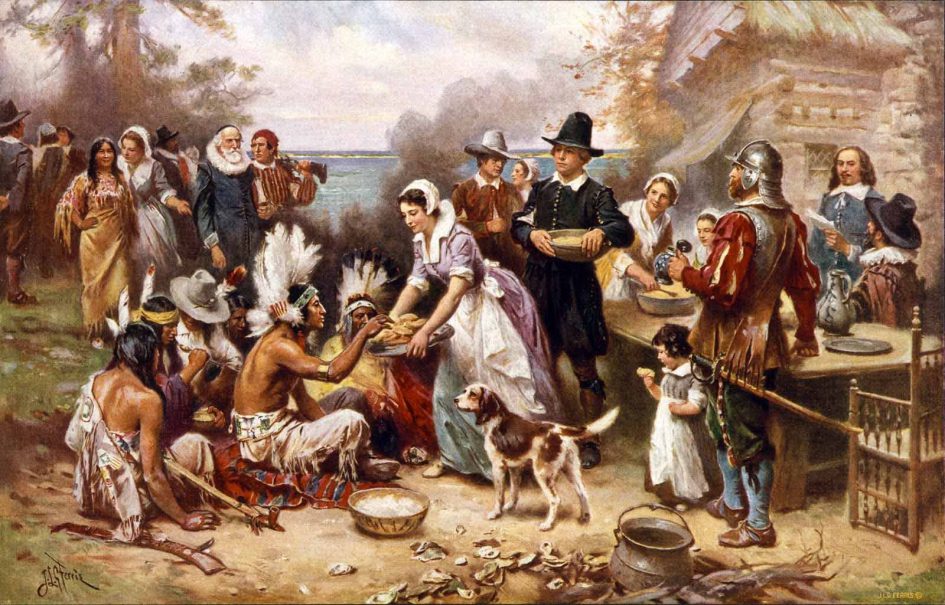What most people believe about Thanksgiving is a variation on what I was taught in public school in the 1960s. The Pilgrims came to Plymouth on a ship called the Mayflower. They were the first English settlers in America. They came for religious freedom. And they had a big feast with Indians, and that was the first Thanksgiving. And that is what G.K. Chesterton calls “The Myth of the Mayflower.”
The goal was no doubt to imitate the first Christians who held all their wealth in common and to ensure mutual aid as fellow Puritan Robert Cushman wrote, “No one will be poorer than his neighbour for seven years’ and, from the nature of the enterprise, if any of us be rich, none of us can be poor.”
First of all, they were not known as “pilgrims” till about 200 years afterwards. They were Puritans, a radical Anglican “low church” sect that loathed the “high church” Anglicans that happened to include the King of England. In fact, about 30 years after the Puritans arrived in America, some of their fellow Puritans back in England arranged for King Charles I (whose wife and children were Catholic) to have his head chopped off.
Read the children’s book from our publisher Libertas Kids!: Faith, Freedom, and the First Thanksgiving
Secondly, there were at least nine other British settlements before the Plymouth colony. All but one of them failed, including the first settlement at Plymouth. The Puritans who came to Plymouth in 1620 almost didn’t survive. Half the settlers died the first winter. They were saved by an American Indian named Squanto, who taught them how to hunt and fish and grow corn.
But here’s what is really interesting: Squanto was a Roman Catholic.
In 1614, he had been captured by an English party led by Captain John Smith (of Pocahontas fame) and taken on a ship to Spain where he was to be sold as a slave. He was rescued by some Dominican friars who instructed him in the Catholic faith. He told them he wanted to return to his people in America. They helped him get to England, where he met John Slaney, who taught him English and arranged for him to get to Newfoundland. Squanto served as an interpreter between the English and the Indians and crossed the Atlantic six times. He was never able to return to his own tribe, because they had been wiped out in a plague.
After he came to the aid of the Plymouth settlers, helping them grow their own food, he arranged for a joint harvest feast with the local Wampanoag tribe. It was this event that is the basis of our Thanksgiving holiday. So Thanksgiving was started by a Catholic American Indian.
And then there is this other thing we never learned in school: In 1621, the year after the Puritans arrived at Plymouth, another group of English settlers arrived in Ferry, Newfoundland. The land had been granted to George Calvert, the First Baron of Baltimore. Calvert’s son, Cecilius, the Second Baron of Baltimore, was granted another chunk of the New World, which he settled in 1832. He called it Maryland. Why did England give this land to George Calvert and his son? As compensation for the fact the George Calvert had been stripped of his title of Secretary State. And why had he been stripped of his title? Because he declared that he was a Roman Catholic. Maryland (named for some woman whose name was Mary) was the first English Catholic settlement in the New World, and one of its founding principles was…freedom of religion.
The Puritans up the coast get all the credit for establishing freedom of religion, but they did not do it. They were actually quite opposed to the idea. They were anything but tolerant. In fact, it was their intolerance that caused them to come to the new world, not persecution. England was not Puritan enough for them. They did not think the Stuarts had gone far enough to do away with the elements of Catholicism that still remained in the Church of England.
Another interesting factoid: The Greek word for Thanksgiving is ε?χαριστ?α or Eucharistia. Catholics should not only celebrate Thanksgiving with a deep sense of prayer, gratitude and joy, but the celebration this day should lead us to remember that our lives as Catholics are a constant act of thanksgiving, through our daily activities, all of which should give glory to God, especially through the celebration of the Eucharist, which, as the Catechism says, “The Eucharist is a sacrifice of thanksgiving to the Father, a blessing by which the church expresses her gratitude to God for all his benefits, for all that he has accomplished through creation, redemption and sanctification. Eucharist means first of all ‘thanksgiving.’”
 The Libertarian Catholic
The Libertarian Catholic


















